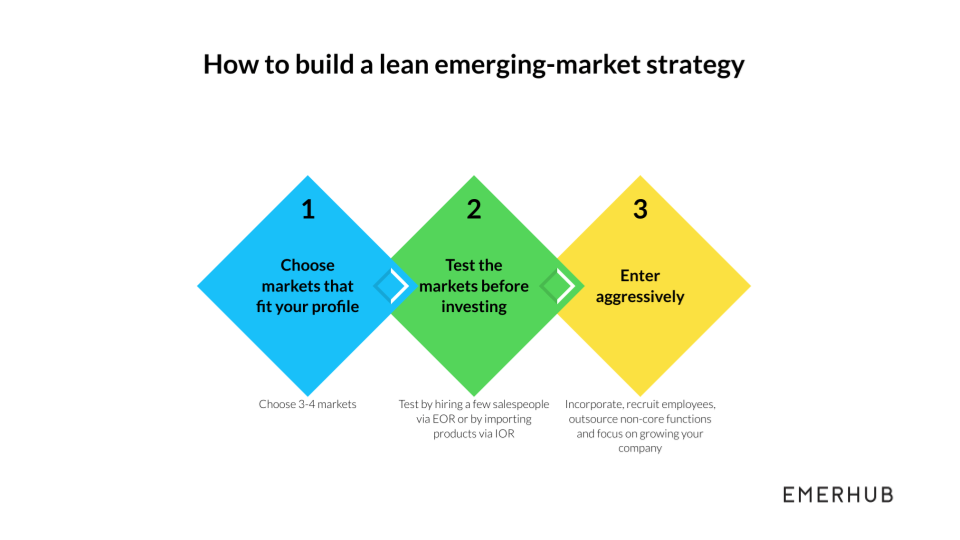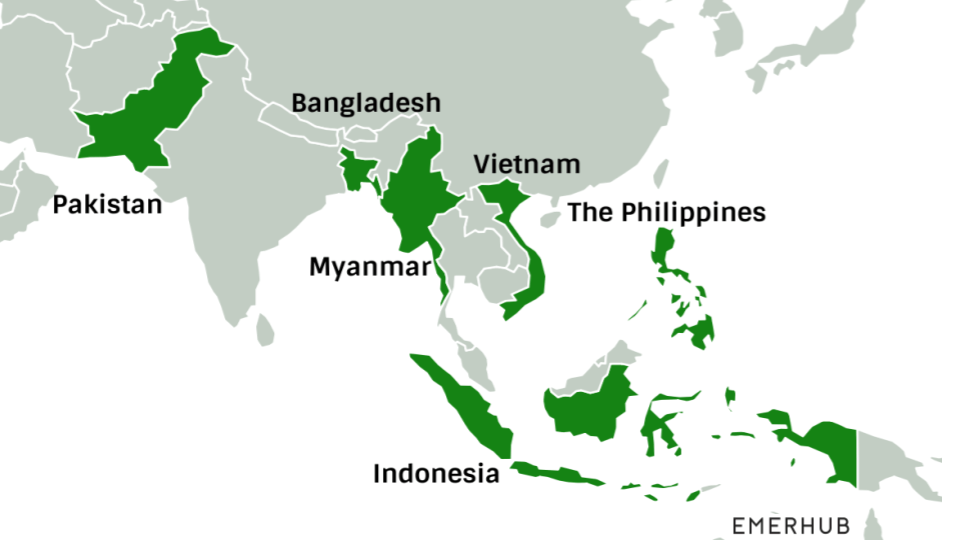Table of contents
Doing business in developing economies can be a challenge even for larger companies. Emerging markets are unpredictable and what works in one market often doesn’t work in another.
However, the key to success here is to use your resources wisely and find strategies that fit emerging markets. We have put together this article to show you how to do business in emerging markets and also give you ideas for building a lean emerging markets strategy.
#1 Choose markets that fit your profile
The first step of expanding your business to new markets is to choose 3 or 4 potential countries that match your profile. In most cases, it comes down to selecting markets with large enough market and small enough competition.
One of the benefits of choosing emerging markets as your destination is their size and rapid economic growth which, combined with increasing consumer demand, offer a tremendous amount of opportunities. They also tend to have entry barriers that keep the competition relatively low.
According to the OECD, ASEAN countries experienced fast GDP growth of 5.1% in 2017, promising an optimistic economic outlook for Southeast Asia in 2018 as well.
Compared to, for example, Latin America where the GDP growth rate varied between 1.5% to 2% the growth in Southeast Asia was remarkable.
Here are some of the emerging markets with large populations and fast economic growth to consider in Asia:
|
Country |
Population |
GDP growth in 2017 |
|
266,643,434 |
5.1% |
|
|
Pakistan |
200,813,818 |
5.3% |
|
Bangladesh |
166,368,149 |
7.1% |
|
106,425,728 |
6.7% |
|
|
96,439,793 |
6.8% |
|
|
Myanmar |
52,855,735 |
6.7% |
Sources: Worldometers (June 2018), IMF World Economic Outlook
The rapid GDP growth in emerging markets
The GDP rates in these markets have continued to grow at a rapid pace in 2018 as well. So far, all these markets have surpassed the average GDP growth of emerging markets (4.9%) throughout the world, according to the IMF World Economic Outlook (April 2018).
#2 Test before investing
“Move fast and break things. Unless you are breaking stuff, you are not moving fast enough.” – Mark Zuckerberg
The idea of the lean market entry strategy is not to conduct thorough market research, develop a perfect strategy first, and then to execute it. In fact, it’s quite the opposite. With this strategy, you will spend less time “choosing” the markets and majority of it testing them in real life.
Below are some of the tactics for trying out new markets. Those methods often cost less than a return flight ticket from your headquarter.
Hire employees in new markets using an employer of record
An employer of record (EoR) is a service provider that hires people on their payroll, but who work for other companies.
Besides other benefits, the employer of record service enables you to hire people almost immediately and without setting up a legal entity in those countries.
In contrast to a professional employer organization (PEO), an EoR will also handle all the legal matters regarding your employees. This way, you can have people working for you instantly without having any legal presence in the markets you are testing. It’s especially beneficial in markets with tricky labor regulations such as the Philippines.
Here are some of the use cases for EoR in the context of this strategy:
- Find (potential) buyers on behalf of your company
- Audit potential vendors and suppliers
- Build relationships with relevant government bodies
- Send your engineers or salespeople to work in new markets temporarily
The power of EoR is that you will not just get research, but you will have actual people working for you full-time. You will be part of selecting them and can assign them tasks as the work progresses. It’s also a sign of trust for your potential local partners – you already have people on the ground.
Also, take note that these professionals can also be of foreign origin and an EoR such as Emerhub can sponsor their work permits.
Import products using an importer of record
If you have physical products you wish to test out, you can import them using an importer of record in Southeast Asia.
Import to emerging markets is generally highly regulated by the governments and using an importer of record is the easiest and fastest way for importing goods to those markets.
An importer of record (IoR) is a professional service provider that enables you to import products without acquiring any import licenses.
Moreover, everything else, from correct documentation to duties and customs clearance, will also be handled on your behalf.
#3 Enter aggressively
At this stage of the strategy, you already have practical experience in the new markets. Once you find a market with clear potential, it’s time to focus your resources on those markets and get them before your competitors do.
However, we are still staying true to our lean strategy. Instead of going big and slow, your focus should be on growing your core business while outsourcing everything else.
Set up a company in emerging markets
Here are the average incorporation timelines for the markets mentioned above:
|
Country |
Standard time of company registration |
|
Indonesia |
6-8 weeks* In some regions, (e.g., Bali) it can take more |
|
Vietnam |
4-8 weeks* |
|
Philippines |
8-10 weeks* |
|
Pakistan |
4-7 weeks* |
|
Bangladesh |
6-8 weeks* |
Note that the incorporation process may take longer if additional licenses are required
We have provided further details about the minimum capital and other requirements in our previous articles about company registration in Indonesia, incorporating in the Philippines, or setting up a small business in Vietnam.
Recruit employees using a corporate headhunter
Finding the best candidates to work for you is no easy task, especially when operating in a foreign market.
However, you can delegate this assignment to a trained professional with the required expertise by using a corporate headhunter service.
A headhunter will free you from time-consuming tasks of:
- Headhunting and sourcing
- Screening and interviewing
- Shortlisting
Outsource non-core business processes
Doing business comprises different types of procedures, from providing your core services and selling your products to non-core activities such as:
- Accounting and payroll management
- Tax reporting
- Distributor search
Laws can be complicated even in familiar markets, not to mention emerging markets where regulations tend to change often.
For this reason, when choosing strategies for doing business in emerging markets, it is wise to outsource such processes to professional service providers such as Emerhub.
In addition to other benefits of outsourcing non-core business processes, you will increase your company’s cost-efficiency and productivity as it lets you focus on your core business.
How to start with building a lean emerging markets strategy
Want to learn more about emerging markets? Contact us for a consultation via the form below or find more information on our market entry strategy page.









